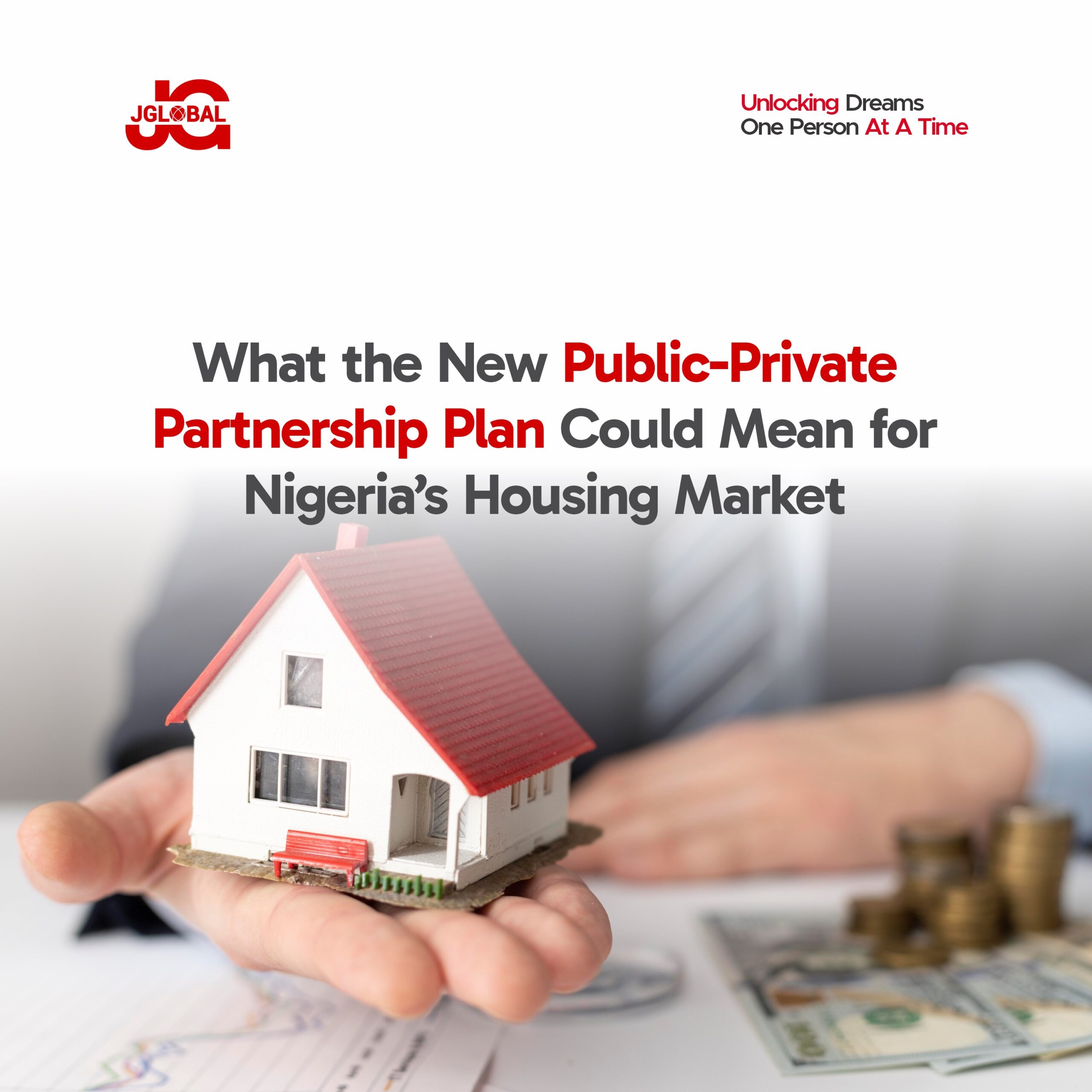What the New Public-Private Partnership Plan Could Mean for Nigeria’s Housing Market

Introduction
Nigeria’s housing market is facing a crisis that cannot be ignored.
In March 2025, the Federal Government announced plans to adopt a public-private partnership (PPP) framework to expand housing finance and bridge this growing housing gap. This move, reported by Nairametrics, signals a new approach to how Nigeria delivers housing, one that leans on collaboration, innovation, and shared responsibility.
But what does this actually mean for developers, buyers, and investors? And will this new model bring real change to the Nigeria housing market or is it just another big announcement with little action?
Let’s break it down.
What Is a Public-Private Partnership in Real Estate?
A public-private partnership, often called PPP, is a working agreement between the government and private companies to deliver a project together. In real estate, this typically means the government provides land, policy support, or incentives, while the private sector handles funding, design, and construction.
Instead of leaving housing development solely to the government or the private sector, PPPs allow both to share responsibilities, risks, and the rewards. This model is already being used globally to deliver affordable housing faster, especially in countries dealing with rapid population growth and limited public resources.
In the Nigerian context, the government might release unused public land or create favorable policies, while private developers build and manage the housing units. These homes are then made available to the public, often with structured payment plans or subsidized mortgage options.
According to the Infrastructure Concession Regulatory Commission (ICRC), PPPs can help close infrastructure gaps by leveraging private sector expertise and capital while keeping projects aligned with public interest.
In theory, everyone wins:
- The government will deliver more housing without taking on all the financial burden.
- Developers will gain access to land, support, and demand.
- Buyers will benefit from more affordable and organized housing options.
But for this to work, the partnership must be transparent, properly regulated, and focused on long-term outcomes not just short-term profit.
Why do Nigeria Need This Housing Reform?
To understand why the government is turning to public-private partnerships, we need to first look at the current state of the Nigeria housing market and it’s not looking great.
As of May 2025, the country’s housing deficit has climbed to over 17 million units, according to the Minister of State for Housing and Urban Development. That means millions of Nigerians still lack access to safe, decent, and affordable homes, despite being part of one of Africa’s fastest-growing urban populations. Despite various national housing policies over the years, the gap keeps growing, especially in urban areas like Lagos, Abuja, and Port Harcourt.
The challenge is deeper than just lack of houses, it’s also about affordability and access to housing finance.
A Lands of Nigeria report from January 2025 highlights how input costs have surged across the board. For example, cement prices in Lagos jumped as much as 25–38% from 2023 to 2025 rising from around ₦5,200 to between ₦6,500 and ₦7,200 per 50 kg bag.
Business Day also confirms that cement prices climbed from ₦9,000–9,500 in early 2025 to ₦10,000–10,400 per bag mid‑2025
Developers are struggling to keep up, and many projects are either abandoned or priced too high for the average Nigerian.
With the government facing limited funding, and the private sector limited by access to land and regulatory bottlenecks, the housing market has been stuck in a cycle of high demand and low supply.
This is why a new approach is necessary.
By introducing a public-private partnership framework, the government hopes to attract private capital, speed up construction timelines, and provide housing finance options that actually work for the average Nigerian.
Potential Impact on the Nigeria Housing Market
If the new public-private partnership (PPP) framework is well implemented, it could bring a much-needed shift in how housing is delivered and accessed in Nigeria.
Here’s how it could impact different players in the Nigeria housing market:
- For Homebuyers
For most Nigerians, the biggest barriers to owning a home are affordability and access to financing. With PPP-backed projects, we may start seeing:
- Lower-cost housing units, especially in emerging locations where land is more available.
- Flexible payment structures, including rent-to-own, instalments, and long-tenure mortgage plans.
- Increased access to government-supported housing finance schemes, possibly through the Federal Mortgage Bank of Nigeria (FMBN) or newly established partnerships with fintech lenders.
If more PPP housing schemes come with verified titles and clear processes, homebuyers may also feel safer investing in them, especially buyers who often fall victim to fraudulent or unregulated developers.
- For Real Estate Investors and Developers
For developers, PPPs may open new doors. The government may provide:
- Access to public land in strategic areas.
- Tax reliefs, subsidies, or guarantees to reduce financial risk.
- Easier access to housing infrastructure funding, like roads, water, and electricity, through joint planning.
This means developers can focus on building without bearing the full cost of land acquisition or urban infrastructure. For real estate investors, this could mean more viable projects to fund, especially those targeting mass housing or middle-income markets.
Also, with better policy direction and risk-sharing, foreign direct investment in Nigeria’s housing sector may rise.
- For the Broader Housing Market
A well-executed PPP strategy could rebalance the supply-demand equation and bring structure to Nigeria’s informal housing space. If PPP projects are scaled up:
- Property prices in certain areas could stabilize, especially where oversupply currently exists in the luxury segment.
- There could be a boost in job creation in construction and building materials.
- Government and private developers may start integrating infrastructure and housing delivery, reducing the number of incomplete or unlivable estates.
Most importantly, if PPPs push developers to build what people can actually afford, not just what looks good on paper, the entire Nigeria housing market could become more inclusive and sustainable.
How Buyers and Investors Should Respond
With the Nigerian government pushing forward a public-private partnership (PPP) framework to improve housing delivery, the next question is: what should you do with this information?
Here’s how to position yourself wisely in this evolving Nigeria housing market:
- Stay Updated on New PPP-Backed Projects
Pay attention to announcements from the Federal Ministry of Housing, ICRC, and trusted developers working on government-supported schemes. These projects often come with better payment plans, verified documentation, and infrastructure support making them safer and more affordable options for buyers.
You don’t want to miss out because you weren’t paying attention.
- Verify Developers and Their Approvals
Just because a project claims to be backed by a government partnership doesn’t mean it actually is.
Before you make any financial commitment:
- Ask for documentation proving the PPP relationship.
- Confirm approvals from relevant housing authorities.
- Engage professionals to verify land titles and project status.
A simple verification process could save you from losing millions.
- Work With Professionals
If you’re buying a home or investing in a housing project, always involve:
- A registered surveyor to confirm land boundaries and location.
- A real estate lawyer to review agreements.
- A licensed agent or advisor to guide you through.
Don’t just rely on what you were told. Get proof and do your due diligence.
- Think Long-Term
PPPs are not just about short-term housing sales. As more of these projects enter the market, areas around them may appreciate in value due to better infrastructure and urban planning.
So, if you’re buying to live or to invest, look beyond the building and think about future growth, location, and resale potential.
Conclusion
The decision by the Federal Government to adopt a public-private partnership (PPP) framework for housing in 2025 could be a defining moment for the Nigeria housing market. With over 17 million Nigerians still in need of decent shelter, the need for innovative, large-scale, and financially sustainable solutions has never been more urgent.
If properly implemented, PPPs could bridge the gap between government policy and private sector efficiency bringing in new housing developments, improving affordability, and giving more Nigerians access to secure homeownership.
As a buyer or investor, your role is to stay informed, ask the right questions, and work with verified professionals. The opportunities will come but only those who are prepared will fully benefit from them.
The Nigeria housing market is changing. Now is the time to pay attention, plan wisely, and position yourself for what’s ahead.



